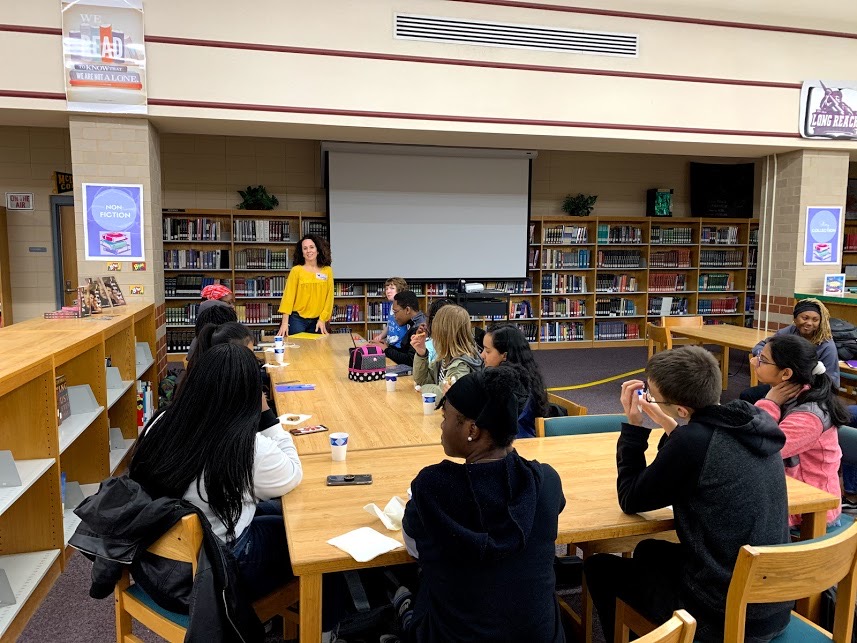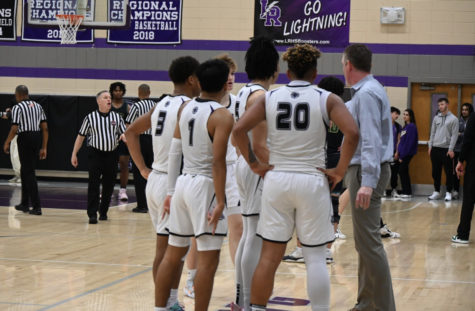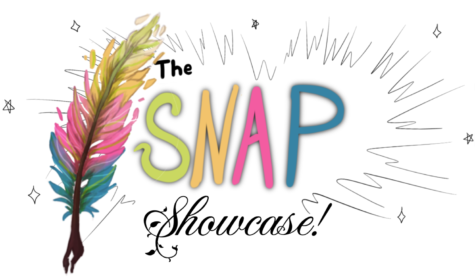An Ugly Beginning
Author Visit and Writer Workshop with Heather Cumiskey
Author Heather Cumiskey with Long Reach High School students in the media center after school. Photo courtesy of Ms. Lee.
How does a writer create a novel from nothing? Heather Cumiskey, who visited Long Reach High School on November 6, 2019, is a young adult author who has a duology, a book series that is made up of two parts, and is currently working on her third novel.
Cumiskey formally introduced herself and stated that she started as a copywriter. However, she took a break to write a book which turned into a duology. Her first novel is I Like You Like This and the second one is I Love You Like That, both of which received multiple awards since their initial publication. The first novel received a bronze for the Moonbeam Children’s Book Awards in 2017, and the second received the same award in bronze in 2019.
Ms. Lee, one of the media specialists who organized the event, said that the purpose of having an author come and talk to students was “to help students who want to be a writer or become better writers and give them the tools to do so.”
This is the second consecutive year Ms. Lee has arranged for a published author to speak at Long Reach in honor of NaNoWriMo, National Novel Writing Month, which is an Internet-based creative project that encourages participants to write a manuscript that includes 50,000 words. Additionally, it takes place during the entire month of November.

Link to Literary Magazine:
https://lrhslitmag. wixsite.com/magazine
Cumiskey said that NaNoWriMo was how she got started on her third novel. She placed emphasis on how writers should focus on getting ideas written down to begin with a draft. She also noted that every beautiful piece of work starts with an ugly beginning. What matters most is getting the ideas down first, then editing later.
Jason Luong, a senior, said that his favorite part about the event was “the advice [Heather Cumiskey] gave and how interactive she was with everyone.”
Ms. Lee also stated that the personalized discussion made her seem accepting and knowledgeable.
Junior Assata Harris said that her favorite part was when the author asked questions about the writing. “She made the visit personal even though we were in a group.”
The interaction between the author and the students who attended is noteworthy because she asked questions directly concerning their interest as well as their writing. For example, in the beginning, she asked the students to share their favorite genre. She then asked about students’ individual pieces of writing and obstacles they encounter during the writing process.
One obstacle is establishing a setting. The advice Cumiskey gave was to look at inspiration boards on Pinterest. She encouraged students to create their own vision board that includes the setting they want, as well as finding celebrities who resemble their characters.
Another piece of advice she gave was to complete writing in chunks. For instance, a writer can do one section a day and then look back at it the next day. Cumiskey explained that by doing so, the writer would be able to see it with new eyes and notice something different. Then, the writer can choose to keep the section or remove it completely.
She advised that whether the writing is to be kept or to be removed, the writer should be kind to him or herself. One of her reasons for saying so is because it will not be perfect, so the writer should not feel pressured when reviewing his or her work.
Cumsikey told the students who attended that if they do not know where to begin, they can start by writing a story they would like to read. For example, if you are reading a book and find that you are not satisfied with the climax of the story, you may come up with your own climax. Then, you can add other parts to make the story complete.
Attendees valued Cumsikey’s expertise and her suggestions for the writing process. Luong stated that if he did not attend he would not “be motivated to do any writing.” He elaborates that something about talking to an author motivates him to write more.
Harris agreed, stating that if she did not attend, she does not think she would have continued to work on her personal story.
Some of the students who attended are working on their own piece of writing. Luong said that he hopes to be a published author himself, so he liked interacting with an author who is already published.
Harris also wants to finish writing her story, and she is applying what she learned from the visit by saying she will “have fun and worry about editing later.”
How to Become a Writer
Read.
Read everything that has been written. Read about topics that you like but also the ones you do not necessarily like. Read novels written in different time periods, different genres–just about everything you can get your hands on.
Join Book Club.
Students who are a part of Book Club get to read a new book about every month. Then at the meetings, they have an open discussion about the reading and the elements they liked about the book. See sponsor Ms. Lee in the media center for any questions.
Find inspiration.
As suggested by Heather Cumiskey, look at vision boards, go to Pinterest, or create a physical one yourself. Keep a notebook with you and jot down anything that captures your attention in your day to day life: An interesting name, a clever phrase someone says, a description of leaves changing color in the fall–anything that strikes you.
Write.
As Heather Cumiskey advised, write ideas down when they come because it is easy to forget. Write about the things that are interesting. No matter what, just write everything down. It can always be deleted or edited.
Revise and edit.
After writing, take a break or rest for the day. Then, the next day, look at it again. It is possible that there might be parts that do not belong or parts that should be added.
Be patient.
It will take time for a piece of writing to develop. It will not become a novel overnight. But it can with a little bit of patience and time.

![Long Reach Boosters Club. (March 24, 2023 - 11:33pm). [Digital Image]. Long Reach Has Talent Show Spring 2023. Facebook, Retrieved April 17, 2023 from https://www.facebook.com/longreachboosters/posts/pfbid03kN5BKQj5TDefz1rtVZ5fTBBhjwA39UPPd8GctyMgFvY7B4RihH4rY4EqE7xPwikl.](https://lrhslightningflash.com/wp-content/uploads/2023/05/LR-Talent-Show-3-475x316.jpg)






